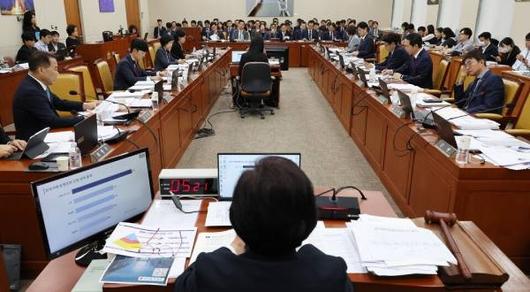 |
On the morning of October 10, a parliamentary inspection targeting the Science, ICT, Broadcasting, and Communications Committee was held at the National Assembly. (Yonhap) |
<이미지를 클릭하시면 크게 보실 수 있습니다> |
The Artificial Intelligence (AI) Act, which was scrapped during the 21st National Assembly, cleared a subcommittee in the standing committee nearly six months after the 22nd National Assembly convened.
As the ruling and opposition parties reached consensus on key issues of the Act, there is growing optimism for its enactment by the end of 2024.
The National Assembly’s Science, ICT, Broadcasting, and Communications Committee on Thursday reviewed and passed 19 AI-related legislative proposals submitted by both parties through a consolidated review.
A key feature of the approved bill is the shift to a risk-based regulatory approach, excluding provisions on “prohibited AI.” Instead, the bill introduces new responsibilities for businesses dealing with “high-impact AI,” which is deemed riskier than general AI.
The high-impact AI concept, initially proposed by Representative Lee Hae-min of the Rebuilding Korea Party, refers to AI systems that could significantly impact human life, physical and mental health, safety, fundamental rights, national security, or public welfare.
The purpose of the legislation is to classify technologies directly related to human life and have the government require businesses to ensure their reliability and safety.
The industry had so far called for clearer definitions of high-impact AI to prevent unnecessary regulatory burdens. Reflecting these demands, the bill allows businesses to request confirmation from the Ministry of Science and ICT on whether their AI technology qualifies as high-impact AI.
The Act also establishes grounds for imposing fines on businesses that fail to fulfill notification obligations regarding high-impact AI. The AI Act also mandates that global AI tech companies, such as OpenAI, operating in Korea appoint a domestic representative for communication with the government.
It also requires AI-generated images and videos to include watermarks.
The AI Act has received positive feedback for balancing responsibilities with measures to promote the AI industry.
The bill includes provisions requiring the government to establish AI promotion plans and enabling the establishment of institutions such as the AI Safety Research Institute and the AI Association. It also outlines support for investments in AI Data Centers, regional development, and startup ventures.
In the same subcommittee meeting, proposals such as the repeal of the Mobile Device Distribution Improvement Act, and amendments to the Telecommunications Business Act were passed without contention.
The Terminal Distribution Act’s repeal, supported by both ruling and opposition parties, is expected to pass the National Assembly’s plenary session smoothly.
The merged bill, combining proposals from Representative Park Choon-kwon of the People Power Party and Representative Kim Hyun of the Democratic Party, repeals the Terminal Distribution Act and abolishes the public subsidy system.
The proposal transfers the optional contract discount - offering 25 percent on service fees - to the Telecommunications Business Act, aiming to ensure consumer welfare.
However, a provision prohibiting discriminatory subsidy payments, a core element of the Democratic Party’s proposal, was excluded.
This provision sought to prevent telecommunications companies from offering unfairly differentiated subsidies based on subscription type, service plans, or residential areas.
이 기사의 카테고리는 언론사의 분류를 따릅니다.
기사가 속한 카테고리는 언론사가 분류합니다.
언론사는 한 기사를 두 개 이상의 카테고리로 분류할 수 있습니다.
언론사는 한 기사를 두 개 이상의 카테고리로 분류할 수 있습니다.


